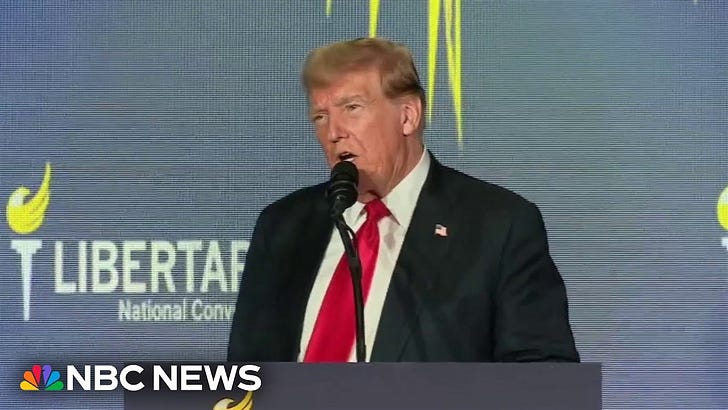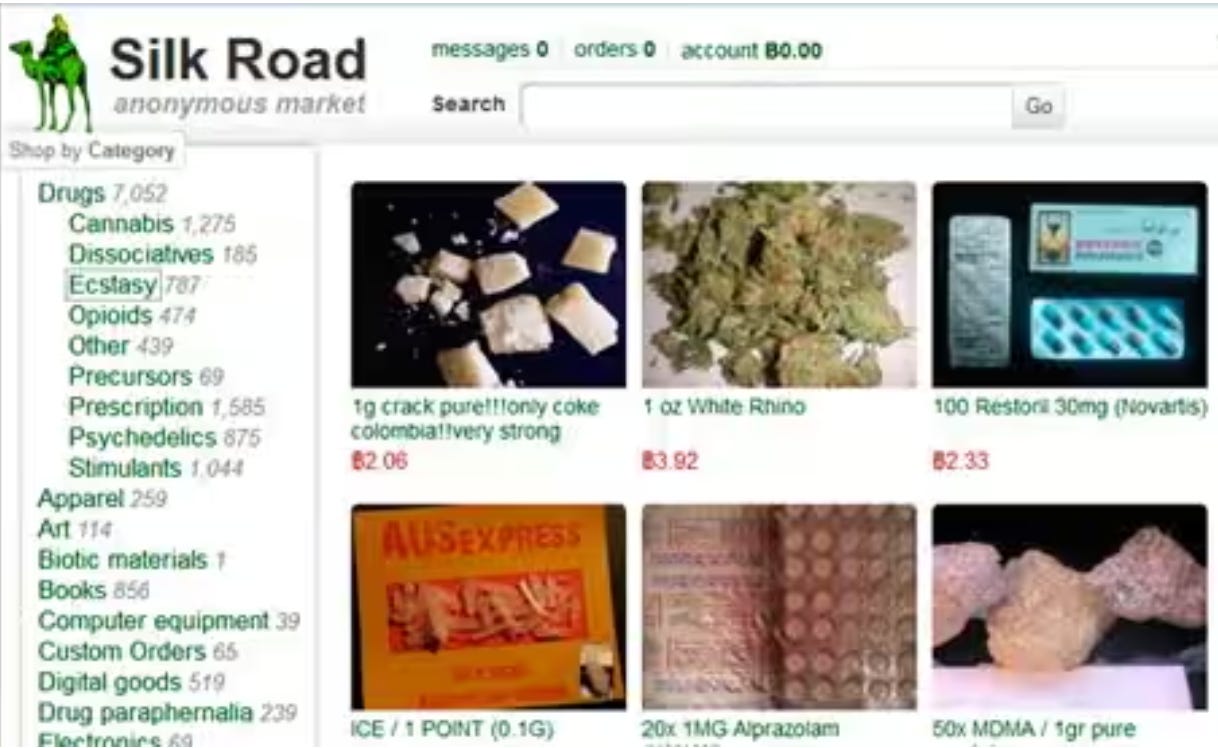Donald Trump does a lot of unexpected things. But I still wasn’t expecting him to promise to commute the sentence of Ross Ulbricht, the founder of the infamous dark net market, The Silk Road.
Earlier this week Trump spoke at a Libertarian National Convention. And in front of dozens of Ulbricht supporters holding ‘Free Ross’ placards, he promised to reduce Ross’ sentence to time served on ‘day one’ if elected.
Ross, now in his 11th year behind bars but still with access to X, was obviously thrilled:
What’s going on? Trump promising to release the man behind the biggest and most notorious online drugs markets? It’s not as odd as it sounds.
A quick reminder of what The Silk Road was. The site – a dark net market place hosted on the Tor network – was set up by Ross in late 2010. In simple terms, it was Amazon or eBay for illicit goods, especially drugs. Users would download the Tor browser, create an account, transfer over some bitcoin – and then be able to browse and purchase products from almost 4,000 vendors.
Hard to imagine now, but this was a revolutionary and brilliantly clever use of Tor and Bitcoin. Ross had worked out how to build a functioning online market place in illicit goods that really worked. By early 2013 around 150,000 users had purchased $1 billion worth of drugs. Everything from basic street marijuana to boutique psychedelics. Ross – whose online moniker was ‘Dread Pirate Roberts’ – was believed to be making $20,000 a day on commission alone.
The original Silk Road darknet market place
It all collapsed on October 2013, when the FBI arrested Ross - who was still in his twenties at that point - in a San Francisco library on suspicion of drug trafficking, soliciting murder, facilitating computer hacking and money laundering. And in 2015 he was sentenced to two life sentences, plus forty years. With no possibility of parole. (There was also some evidence that Ross might have tried to order a ‘hitman’ to get rid of a troublesome Silk Road administrator. But no-one was ever murdered, and Ross was never charged for it.)
Sounds damning. But there’s another side to this story. Ross admits he was guilty and regrets what he did. But he’s always maintained the Silk Road was designed reduce the societal harm of drugs. And as a life-long libertarian, that meant removing the governments, and letting people decide what to put in their bodies. That sounds like a convenient cover story, but I spent a lot of time on the Silk Road before the FBI closed it down, and there is some truth in it. When you first arrived at the Silk Road homepage, a message from Dread / Ross greeted you:
I’d like to take a moment to share with you what the Silk Road is and how you can make the most of your time here. Let’s start with the name. The original Silk Road was an old-world trade network that connected Asia, Africa and Europe. It played a huge role in connecting the economies and cultures of these continents and promoted peace and prosperity through trade agreements. It is my hope that this modern Silk Road can do the same thing, by providing a framework for trading partners to come together for mutual gain in a safe and secure way.
The name Dread Pirate Roberts itself was taken from the 1973 book The Princess Bride in which the Pirate was not one man, but a series of individuals who periodically passed the name and reputation to a successor. The name was chosen for a reason. Silk Road was a movement. ‘We are NOT beasts of burden to be taxed and controlled and regulated,’ wrote Dread / Ross in April 2012. ‘The future can be a time where the human spirit flourishes, unbridled, wild and free!’
According to Doctor X, a qualified doctor who used to give medical advice on the Silk Road forums, Ross was motivated by many different things. But one of them was reducing harm.
When sentencing Ross Ulbricht in 2015, Judge Forrester spent a decent chunk of time dismantling this ‘harm reduction’ argument, saying user harm reduction was only one small part of the ‘massive’ social harms created by the drugs trade that Ross was enabling. Perhaps that’s true. But in some ways the Silk Road really did make drugs use safer – at least for some people. This was principally because it operated a user review system, not dissimilar to Amazon. After each purchase, a buyer was encouraged to return to the site and leave a score out of five plus written feedback. That drove up customer service and drug quality, as vendors became desperate to keep punters happy. When you purchase a drug on the street, you have no reliable way of judging what you’re buying, and no recourse if things go wrong. That’s why on the streets drug purity is wildly variable: the average purity of street cocaine is 25 per cent, but has been found as low as 2 per cent – typically cut with mixing substances such as benzocaine by middlemen and pushers. Not knowing what you’re putting in your body can have tragic consequences. The Silk Road, by contrast, would typically sell cocaine with a purity level of over 70 per cent, sometimes well over 90 per cent. In 2009–10, for example, a contaminated product led to forty-seven heroin users in Scotland being infected with anthrax. Fourteen died.
And when I analysed customer feedback data from the Silk Road, over 95 per cent of the 120,000 reviews scored the maximum five out of five; only 2 per cent were one out of five.
And consider how people got their drugs. Silk Road drugs users would click a few buttons and the products would arrive in the post a few days later. Compare that to hanging around on street corners.
Obviously the Silk Road opened up more drugs, and more dangerous drugs, to more people. Including young people. That doesn’t reducing harm. But for those who knew what they were doing, I suspect it did. All because Ross had managed to create a functioning, competitive online market for a product people want. Which is one reason libertarians tend to see Ross as a misunderstood hero, rather than a drugs king-pin.
I always felt that, while Ross Ulbricht was certainly guilty of the charges, the sentence itself was extremely harsh. Double life sentence plus forty years?! That was more than even the prosecution asked for. One of his nine convictions was under the ‘Continuing a Criminal Enterprise’ law. This is often dubbed the ‘kingpin statute’, since it targets large-scale drug traffickers. Many felt that was unfair.
I think the reason for the harsh punishment was that the authorities were terrified. This was 2015, and the dark net markets were running rampant. After the Silk Road was shut down, even more popped up – each one a little better than the last. The authorities were scared of losing control. Tor web-browsers and bitcoins all seemed ungovernable. I think the judge decided exemplary punishment was the only answer. If we can’t stop these sites, let’s terrifying everyone instead. It turns out that didn’t really work. But what did work was better policing – and I think the authorities are finally get on top of the dark net markets for the first time in a decade. And exemplary punishment of people like Ross might no longer be necessary.
So I do understand the logic of Trump’s promise to commute Ross’ sentence. Maybe it’s just a cheap ploy to win over some libertarian voters, but either way, it’s not as crazy as it sounds. Besides, I’m pretty sure Ross Ulbricht is a reformed man, and, given the state of cyber security these days, would be far more useful outside a prison than in it.
But there is another factor at play too. It might seem odd for an apparently conservative republican to offer clemency to a man who set up and pioneered a massive online drugs bazaar. Hardly a vote winner among the base. When Ross sentenced was first announced, plenty on the right seemed thrilled.
But Trump’s base is varied, and plenty of Libertarians seem tempted by his anti-establishment tone. Free Ross has become a rallying cry for libertarians of all shades: a loose criticism of an ill-defined ‘system’ that crushes anyone who makes even the slightest dash in pursuit of individual liberty. A strike against a society that will lock people up and throw away the key, just to set an example.
Which is something I imagine might have been on Donald Trump’s mind when he made the announcement this week.





